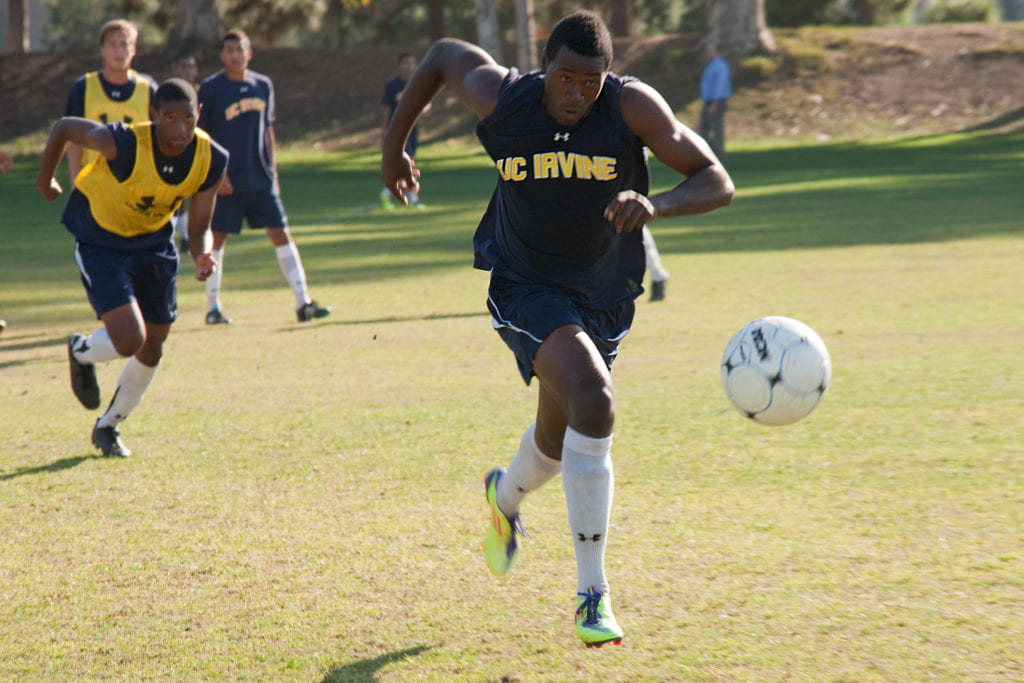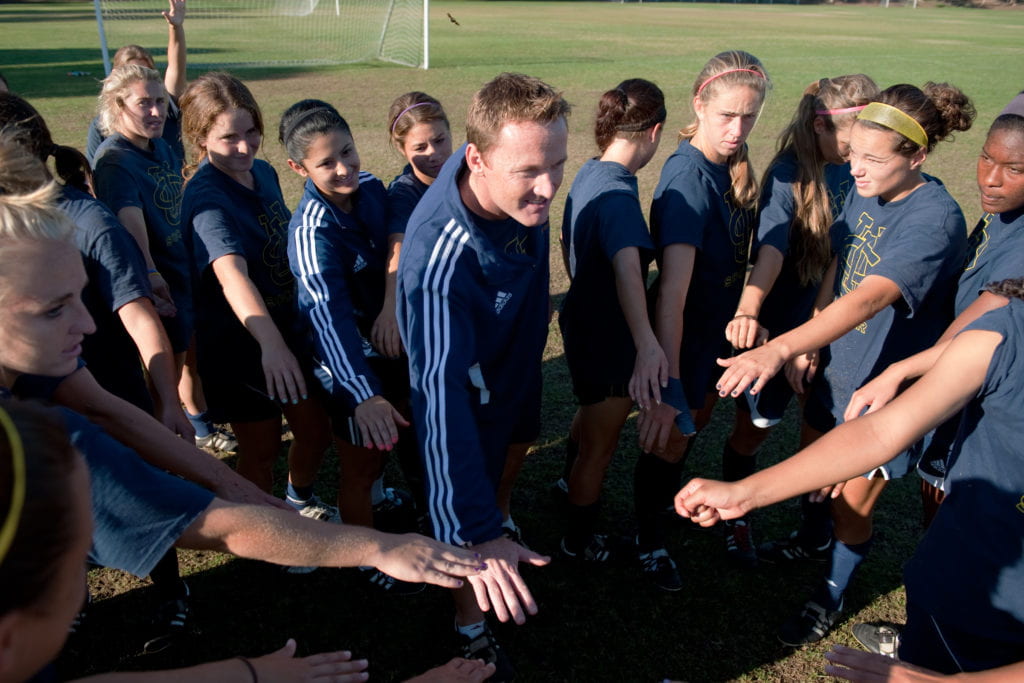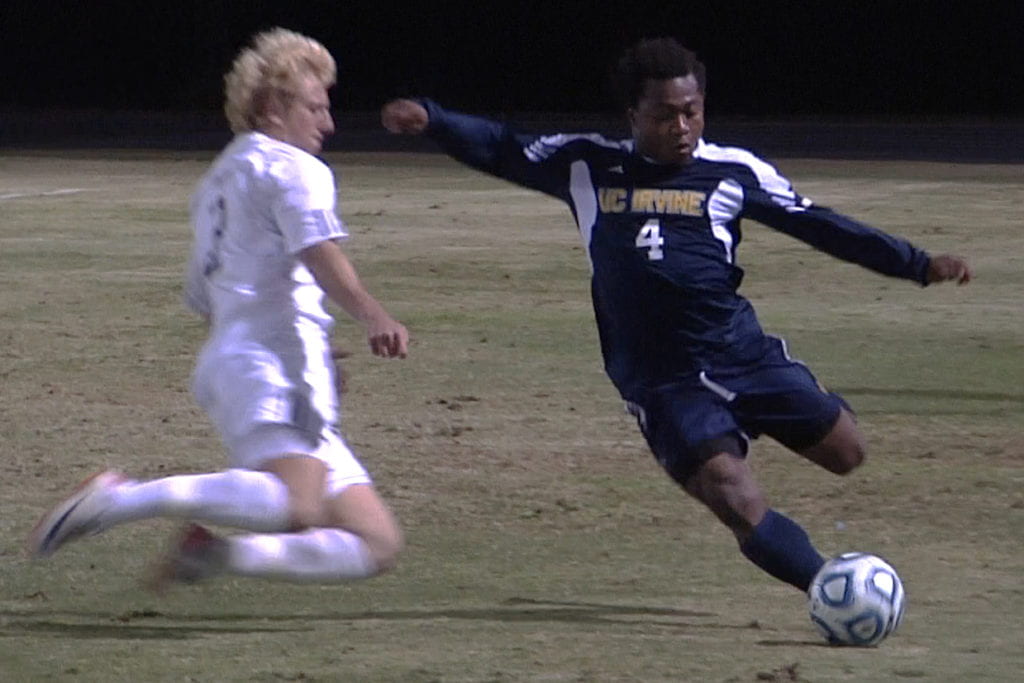Playing on a higher plane
After years of slow but steady progress, Anteater soccer broke through to a new plateau in 2011. With stellar coaching, a burgeoning soccer culture and strong grassroots support, UCI is on its way to becoming the soccer capital of the West.
The eyes of the collegiate soccer world were focused on Anteater Stadium the weekend of Nov. 11, as the UC Irvine women’s and men’s teams played thrilling matches that showed how far the two programs have come and how promising their futures are.
On the evening of Veteran’s Day, the women’s squad hosted the University of San Diego in the first round of the NCAA tournament, losing in overtime by penalty kicks, 5-3. The next night, the men’s team endured cold, rain and a determined UC Santa Barbara to win — for the third time in four years — the Big West tournament championship 3-2 in extra time, thus earning a first-round bye in the NCAA tournament.
It’s no coincidence that two such important games came back-to-back. After years of slow but steady progress, Anteater soccer broke through to a new plateau in 2011. Along with both squads earning NCAA tournament bids, UCI became one of only six universities nationwide to have men’s and women’s teams ranked in the top 25, joining such established soccer powerhouses as North Carolina and UCLA.
It’s a lofty status, and one well earned. With stellar coaching, a burgeoning soccer culture and strong grassroots support, UCI is on its way to becoming the soccer capital of the West.
“It’s been an amazing ride,” says George Kuntz, men’s head coach since 1995. “We’ve grown the UCI brand, and both programs can continue to be top ones. We’ve shown that.”
“We’ve gotten over the hump,” adds Scott Juniper, women’s head coach since 2006. “We can compete with the best teams in the country. The future is really bright for us and the sport.”
Irvine’s success coincides with soccer’s increasing popularity in the U.S. Millions of children nationwide play in organized leagues, and Major League Soccer draws more fans to an average game than the NBA and NHL do.
At the youth level, Orange County is a hotbed of soccer talent. And thousands of these kids know UCI well, having attended soccer camps — many on campus — led by Kuntz, Juniper or their players.
This connection to the local soccer community is the linchpin of both programs; their rosters are stocked with players from area high schools and colleges.
“All those kids who came to camps at UCI 10 years ago are now college age,” says Kuntz, whose ties to youth soccer are long and deep. “That’s what we’re excited about. Everywhere we go, people are talking about Irvine soccer.”
With this foundation, he and Juniper agree, UCI is also building a national profile as an attractive location for out-of-area recruits.
Women’s soccer’s success has been aided by players transferring from big-time programs, such as those at UCLA and the universities of New Mexico and Florida. One of the Anteaters’ greatest-ever standouts, All-America defender CoCo Goodson — now on the MAC Hermann Trophy Watch List for women’s college player of the year — transferred from the University of Texas.
“Players are realizing that at UCI, they can go to a top academic school, live in a beautiful part of the country and compete with the best,” says Juniper, whose 2010 team went undefeated in conference and made the NCAA tournament’s Sweet Sixteen. “We have developed an environment where it’s possible to succeed at the very highest levels right here in Irvine, so players don’t need to go to Palo Alto or Westwood, and because of that, we’re getting top-tier players.”
Adds Kuntz, whose team lost 2-1 to Saint Mary’s College on Nov. 20 in second-round NCAA tournament play: “Both teams are also fun to watch. And the opportunity is there to get to an even larger stage.”


